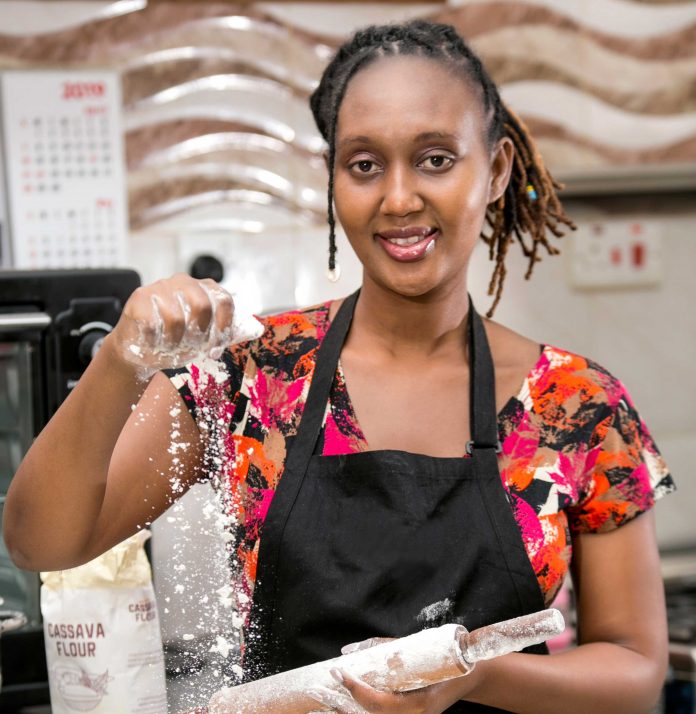Her artistic touch has helped her carve a niche in the baking industry
By Amos Wachira
Carol Musyoka, the cheery woman with a ready smile, could have been an excellent tours operator, but her love for cakes drove her towards an old passion; baking.
Coming from a family with a background in baking, she had tasted, -and fallen in love- with cakes from an early age. Her mother used to bake cakes, and many are the times the young girl could sample her cakes, as well as the cherries. Since then, she says she developed a sweet tooth, and an insatiable taste for cakes.
Like most young girls, she wasn’t sure about her career aspirations. At one point, she wanted to be a neurosurgeon, a nurse, or a lawyer, but not a baker.
When she completed her high school education, she would work as a merchandiser for a year, earning a paltry kes 500 per week. With the meagre wages, she still managed to buy cakes on her way home, something that didn’t auger well with her mum.
“My mum could ask, how much money did you make to afford buying a cake everyday?”
Like any other parent, Carol’s mum wanted to harnes her passion into a useful skill. It helped that one of Carol’s aunts was into commercial baking. When her mum decided to introduce her to the baking industry, she didn’t have to look far away. Carol’s aunt agreed to train her and before long, the young girl was on her way to realizing one of her dreams. “The first day, I said I wanted to learn how to make a blackforest cake,” she remembers.
A fast learner, it didn’t take her long before she became a star student.
“After three months, I had learnt so much that I could take client briefs and advise on cake decorations.”
Back then, cake decorations were not for the faint hearted. She says that there were no tools to help decorators to cut out designs. “We used to sketch everything by hand. Unlike today when there are many tools at our disposal.”
At her Aunt’s kitchen, Carol realized she had an artistic touch as far as cake decorations went. This further fuelled her drive to be the best baker that she could be.
When she enrolled at the university of Nairobi for a course in tourism management, she was already an established baker. She could juggle between studying and baking. “I could attend evening classes after baking for the whole day.”
It was at her aunt’s that she learned crucial business lessons that would come in handy later on.
“After an event, guests followed us to the car to ask if we had more cakes,” she recalls.
Her star was rising, and so were her dreams.
Bouyed by the potential of the baking industry, Carol was keen on launching her business. “I felt I needed to grow so I left my aunt. However, I didn’t have any equipment to bake, so I made a pact with her to bake my cakes at her kitchen, on condition that I footed her electriciry bill.”
At this point, carol was already exposed to baking programs and recipes and was trying new ideas; baking unique cakes.
A risk taker, she could try unique and rare recipes, carving out her niche in the competitive industry.
“The healthy eating craze was there and more people were into gluten free and dairy free cakes. I was among the few bakers who could do gluten free cakes.”
To get her product out there, she could bake a cake, cut it into small pieces before giving it out to her sister to distribute to colleagues at her workplace. Her effort paid off. She got her first customers and was raring to venture into business.
As fate would have it, her plan to bake cakes at her aunt’s kitchen didn’t work for long. Although she had gained a few customers, she hadn’t figured out how she could run the business. At around the same time, she got an internship in a tours company, earning a stipend of kes6000 that helped her buy some essential baking equipment. With customers to serve and a 9-5 job, she had to learn how to multitask.
“I could wake up early, bake cakes, carry them to the office and distribute them during my lunchbreak.”
Before long, her business was peaking. “I realised I was earning more money from my side job than I was getting from the internship and called it quits.”
In 2011, she registered her business, Cherry Cakes Kenya to provide a wide variety of cakes to her growing list of customers.
She says she likes to spread joy, and cakes are one of the ways she does that.
Her company bakes cakes for all reasons,she says.
“Whether It’s a birthday, bridal shower, tea, or any reason, we have you sorted.”
Launching a business is one thing, and growing it is another.
Although she felt that she had lots of time to concentrate on growimg the business, she says she realized that she didn’t have enough time to grow it.
At first she was running the show; taking orders from customers, marketing her product, baking and delivering the cakes.
“I burnt out due to fatigue,” she says.
Another challenge that she had was pricing. When she launched the business, she had adopted her aunt’s price list, not knowing that her aunt hadn’t factored in many other costs, like time, delivery and staff salaries.
Her cakes were cheap. She says she imagined that if she could sell them at a cheap price, she could have customers flocking to her door. That wasn’t the case.
“ Despite the low prices, customers could bargain even more.”
It didn’t help that she lacked a financial background.
“Separating personal and business finances was a tall order,” she shares.
With a fledgling business that was making low revenues, she found herself running out of ideas to sustain the business.
She had to enroll for personal finance classes to turnaround the business.
When she met her husband, the business got a new lease of life.
“He could help me sort the business side of things,” she says.
Her husband also helped her reinvent the business.
“He could carry cupcakes to his office to give to his colleagues, who later became my clients.”
One of the things that Carol did to breathe new life into her business was to increase the price of cakes to cover costs.
Like most startups in the food industry, she also struggled with deliveries as most of the third parties that she contracted to deliver her cakes weren’t reliable.
Fed up with unreliable services, she decided to deliver the cakes directly to her customers.
“When online taxis came, they eased my delivery process. I can easily send a cake to a customer at low costs. Besides, we share the delivery cost with the customer.”
Most startups struggle to get the right people, and Cherry Cakes Kenya was not an exception. As the business grew, she needed to hire people to help her run the show.
“The problem is most people lack the experience. When you hire them, you have to train them how to bake. After learning the ropes, most leave to try their hand in baking,” she says. As such, she keeps on hiring and training new people, an expensive affair that deals a blow to the continuity of the business.
To mitigate this, she trains her employees to handle one thing at a time, in a way that all of them work as a team to complete the baking and decoration process.
In the early days of her business, she also struggled with time management.
“You could find me in the kitchen at 4 a.m,” she says.
At one point, she was so exhausted that she couldn’t stand up and had to be lifted and rushed to hospital. From that time, she no longer works for long hours.
“I also realized I didn’t have time to be with my kids so I decided to work from home to be close to them.”
She also says that women entreprenuers face unique challenges when running a business. For instance, many are the times that people try to put them down. “As a woman, you have to be strong. You have to rise above the challenges.”
For the last nine years, she has managed to beat many of these challenges to grow her business.
Having seen it all, she has the following recommendations for any entrepreneur.
“Let go. Separate personal finances from business finances and know your product.”
“Find a way of making yourself different from the competition. Overcome your fears. Try new things.”
“The best feedback comes from a customer who rejected your products or services,” she adds.
Having laid the framework for a thriving enterprise, she is raring to live her dream of establishing a contemporary bakery, with a playhouse for children and an outdoor space where her customers can host birthday parties.
“I’m set for it,” she says.



















